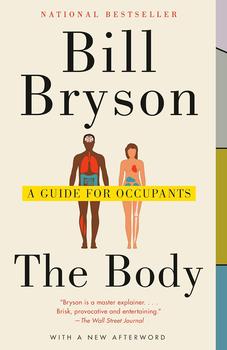Summary | Excerpt | Reviews | Beyond the Book | Readalikes | Genres & Themes | Author Bio

Critics' Opinion:
Readers' Opinion:
First Published:
Oct 2019, 464 pages
Paperback:
Jan 2021, 464 pages
 Book Reviewed by:
Book Reviewed by:
Kim Kovacs
Buy This Book
7. THE HEART AND BLOOD
Stopped.
Last word of British surgeon and anatomist Joseph Henry Green (1791– 1863)
while feeling his own pulse
I
THE HEART IS the most misperceived of our organs. For a start, it looks nothing like the traditional symbol associated with Valentine's Day and lovers' initials carved into tree trunks and the like. (That symbol first appeared, as if from out of nowhere, in paintings from northern Italy in the early fourteenth century, but no one knows what inspired it.) Nor is the heart where we place our right hand during patriotic moments; it is more centrally located in the chest than that. Most curious of all, perhaps, is that we make it the emotional seat of our being, as when we declare that we love someone with all our heart or profess a broken heart when they abandon us. Don't misunderstand me. The heart is a wondrous organ and fully deserving of our praise and gratitude, but it is not invested even slightly in our emotional well-being.
That's a good thing. The heart has no time for distractions. It is the most single-minded thing within you. It has just one job to do, and it does it supremely well: it beats. Slightly more than once every second, about 100,000 times a day, as many as 3.5 billion times in a lifetime, it rhythmically pulses to push blood through your body—and these aren't gentle thrusts. They are jolts powerful enough to send blood spurting up to three meters if the aorta is severed.
With such an unrelenting work rate, it is a miracle that most hearts last as long as they do. Every hour your heart dispenses around 70 gallons of blood. That's 1,680 gallons in a day—more gallons pushed through you in a day than you are likely to put in your car in a year. The heart must pump with enough force not merely to send blood to your outermost extremities but to help bring it all the way back again. If you are standing, your heart is roughly four feet above your feet, so there's a lot of gravity to overcome on the return trip. Imagine squeezing a pump the size of a grapefruit with enough force to move a fluid four feet up a tube. Now do that again once every second or so, around the clock, unceasingly, for decades, and see if you don't feel a bit tired. It has been calculated (and goodness knows how, it must be said) that during the course of a lifetime the heart does an amount of work sufficient to lift a one-ton object 150 miles into the air. It is a truly remarkable implement. It just doesn't care about your love life.
For all it does, the heart is a surprisingly modest thing. It weighs less than a pound and is divided into four simple chambers: two atria and two ventricles. Blood enters through the atria (Latin for "entry rooms") and exits via the ventricles (from another Latin word for "chambers"). The heart is not really one pump but two: one that sends blood to the lungs and one that sends it around the body. The output of the two must be in balance, every single time, for it all to work correctly. Of all the blood pumped out of your heart, the brain takes 15 percent, but actually the greatest amount, 20 percent, goes to the kidneys. The journey of blood around your body takes about fifty seconds to complete. Curiously, the blood passing through the chambers of the heart does nothing for the heart itself. The oxygen that nourishes it arrives via the coronary arteries, in exactly the way oxygen reaches other organs.
The two phases of a heartbeat are known as the systole (when the heart contracts and pushes blood out into the body) and diastole (when it relaxes and refills). The difference between these two is your blood pressure. The two numbers in a blood pressure reading—let's say 120/80, or "120 over 80" when spoken—simply measure the highest and lowest pressures your blood vessels experience with each heart-beat. The first, higher number is the systolic pressure; the second, the diastolic. The numbers specifically measure how many millimeters of mercury is pushed up a calibrated tube.
Excerpted from The Body by Bill Bryson. Copyright © 2019 by Bill Bryson. All rights reserved. No part of this excerpt may be reproduced or reprinted without permission in writing from the publisher.





The Flower Sisters
by Michelle Collins Anderson
From the new Fannie Flagg of the Ozarks, a richly-woven story of family, forgiveness, and reinvention.

The House on Biscayne Bay
by Chanel Cleeton
As death stalks a gothic mansion in Miami, the lives of two women intertwine as the past and present collide.

The Funeral Cryer by Wenyan Lu
Debut novelist Wenyan Lu brings us this witty yet profound story about one woman's midlife reawakening in contemporary rural China.
Your guide toexceptional books
BookBrowse seeks out and recommends the best in contemporary fiction and nonfiction—books that not only engage and entertain but also deepen our understanding of ourselves and the world around us.